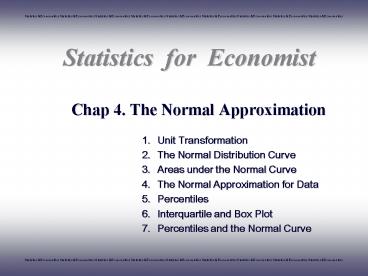Unit Transformation - PowerPoint PPT Presentation
1 / 25
Title:
Unit Transformation
Description:
Chap 4. The Normal Approximation Unit Transformation The Normal Distribution Curve Areas under the Normal Curve The Normal Approximation for Data – PowerPoint PPT presentation
Number of Views:156
Avg rating:3.0/5.0
Title: Unit Transformation
1
Chap 4. The Normal Approximation
- Unit Transformation
- The Normal Distribution Curve
- Areas under the Normal Curve
- The Normal Approximation for Data
- Percentiles
- Interquartile and Box Plot
- Percentiles and the Normal Curve
2
INDEX
The Normal Approximation for Data
Percentiles and the Normal Curve
3
1. Unit Transformation
Unit Transformation
- A transformation which adds a constant or
multiply by a constant to a measurement value. - Standardization is a kind of unit transformation
which subtracts average and divide by SD.
4
1. Unit Transformation
Unit Transformation
Standardization
The shape of distribution is indifferent to the
unit.
5
INDEX
The Normal Approximation for Data
Percentiles and the Normal Curve
6
2. The Normal Distribution Curve
Normal Distribution Curve
- The normal distribution is an ideal histogram.
This is a mathematical model approximating the
distribution of the real data and is a
distribution of population.
- is population mean and
- ? is population standard deviation
7
2. The Normal Distribution Curve
Standard normal distribution
- Among normal distributions, satisfying
- E(X)0, SD(X)1
- the area under the standard normal curve
- between -1 and 1 about 68
- between -2 and 2 about 95
- between -3 and 3 about 99.7
8
2. The Normal Distribution Curve
A histogram for heights of women compared to the
normal curve
9
INDEX
The Normal Approximation for Data
Percentiles and the Normal Curve
10
3. Areas under the Normal Curve
Finding areas under the normal curve (I)
Standard normal
z .00 .01 .02
0.0 .0000 .0040 .0080
0.1 .0398 .0438 .0478
0.2 .0793 .0832 .0871
0.3 .1179 .1217 .1255
0.4 .1554 .1591 .1628
0.5 .1915 .1950 .1985
0.6 .2257 .2291 .2324
0.7 .2580 .2611 .2642
0.8 .2881 .2910 .2939
0.9 .3159 .3186 .3212
1.0 .3413 .3438 .3461
1.1 .3643 .3665 .3686
- Use the standard normal distribution table.
0
z
The area between 0 and 1 is 34.13
11
3. Areas under the Normal Curve
Finding areas under the normal curve(II)
- Find the area between -2 and 1 under the standard
normal distribution curve.
? the area between -2 and 0 is the same as the
area between 0 and 2, by symmetry ? the area of
it is about 48 and the area between 0 and 1 is
about 34 ? so the area between -2 and 1 is
about 483482
12
INDEX
The Normal Approximation for Data
Percentiles and the Normal Curve
13
4. Normal Approximation for Data
The Average and SD
- By the center and the spread around the center,
the average and SD summarize a histogram which
follows the normal curve.
The average and SD are good summary for a
histogram.
14
4. Normal Approximation for Data
Normal approximation
Ex) What is the ratio of the men whose heights
are between 150.4cm and 176cm ?
176cm
167.5cm
150.4cm
standardization
-
2
1
0
Sketch in the standard normal curve
- ? convert to standard units (from -2 to 1)
- ? find the area above the shaded standard-units
interval - ? about 82 (exactly 83.2)
15
INDEX
The Normal Approximation for Data
Percentiles and the Normal Curve
16
5. Percentiles
Histogram for families by income
- Not all the histograms follow the normal curve.
No one has negative incomes in the income
histogram. But the normal approximation suggests
that about 8 of the families had negative
incomes. The histogram does not follow the normal
curve at all well.
17
5. Percentiles
Percentiles for family income
- Percentiles are good summaries for such a
histogram having a long tail.
percentile income(10/year)
1 147.3
10 743.6
25 1,200
50 1,800
75 2,572.5
90 3,696.3
99 11,540
10 of families had incomes of 7,436 or less,
and 90 were above.
18
INDEX
The Normal Approximation for Data
Percentiles and the Normal Curve
19
6. Interquartile and box plot
interquartile
- interquartile
- the 25th, 50th and 75th percentiles are the 1st
, 2nd and 3rd quartile. Especially, the 50th
percentile is just the median and the 2nd
quartile. - Interquartile Range
(interquartile range)(3rd quartile)-(1st
quartile)
20
6. Interquartile and box plot
- Five number summary for data minimum, the 1st
quartile, 2nd quartile, 3rd quartile, and the
maximum - Box plot describes the five number summary
- Two vertical lines of the box indicates the
minimum and the maximum. - Three horizontal lines in the box indicates three
quartiles. - Sometimes the 10 and 90 are used instead.
21
6. Interquartile and box plot
Box plot (family income)
22
6. Interquartile and box plot
Weekly profitability of firms in 2000
20
1 KOSPI 2 ???? 3 SK ??? 4 ???? 5
???? 6 ??? 7 ??? 8 ???? 9 ???? 10
????
15
10
5
Weekly profitability()
0
-5
-10
-15
-20
1
2
3
4
5
6
7
8
9
10
??
23
6. Interquartile and box plot
Comparison of Samsung Electronics and POSCO
40
30
Samsung Electronics from the minimum -26 to
the maximum 37
20
Weekly profitability()
10
0
The range of POSCO is smaller than that of Samsung
-10
-20
-30
POSCO
Samsung
Firm
24
INDEX
The Normal Approximation for Data
Percentiles and the Normal Curve
25
7. Percentiles and Normal Curve
Finding Percentiles
- Ex) Estimate the score of the upper 5 at the
midterm of statistics. (E(X)27.93, Var(X)8.522)
? when z 1.65, the size of 0,1.65 is 45 ?
1.65 8.52 14.06 ? 27.93 14.06 41.99
-0.19
13.87
27.93
41.99
56.05
Midterm score
1.65
0
Standard unit































